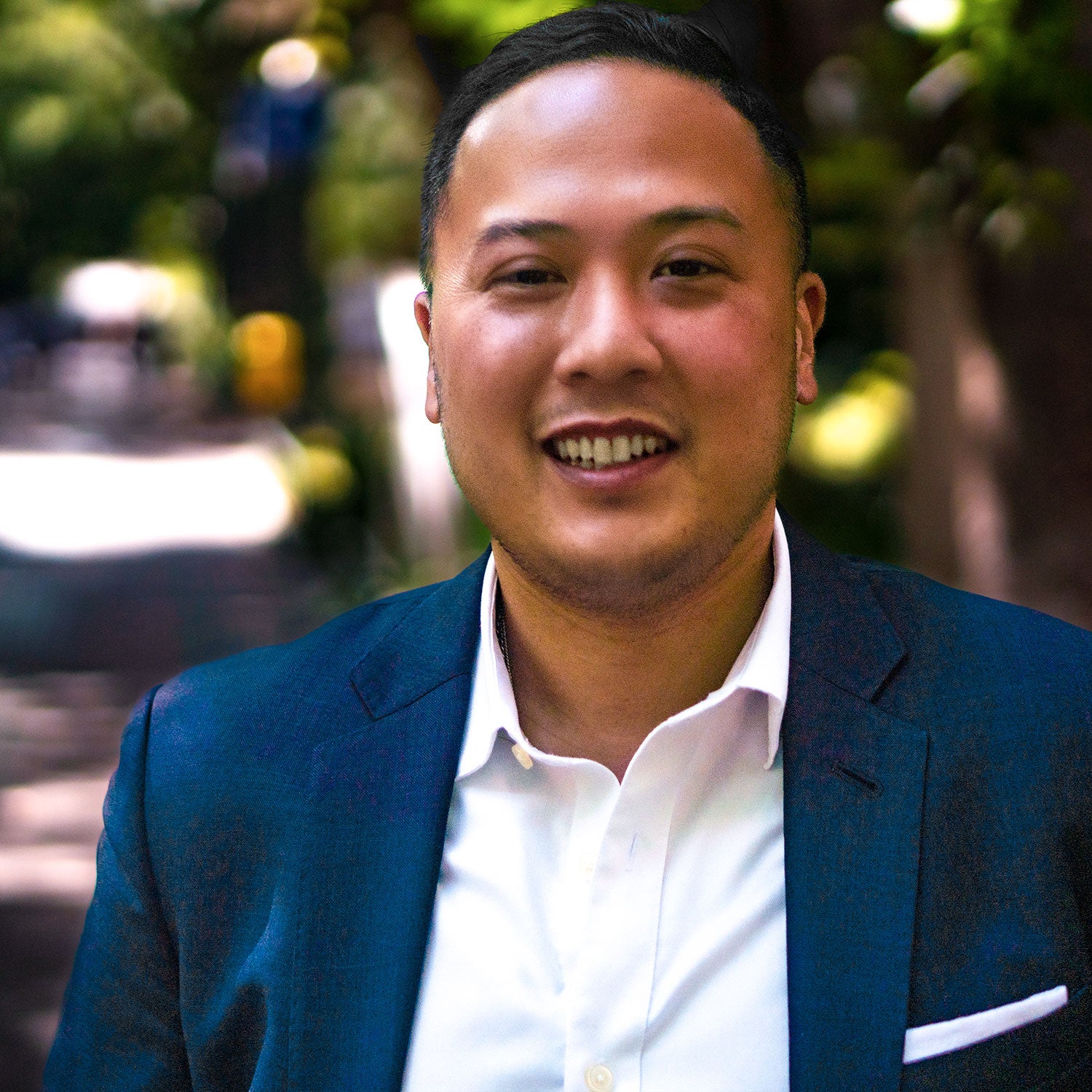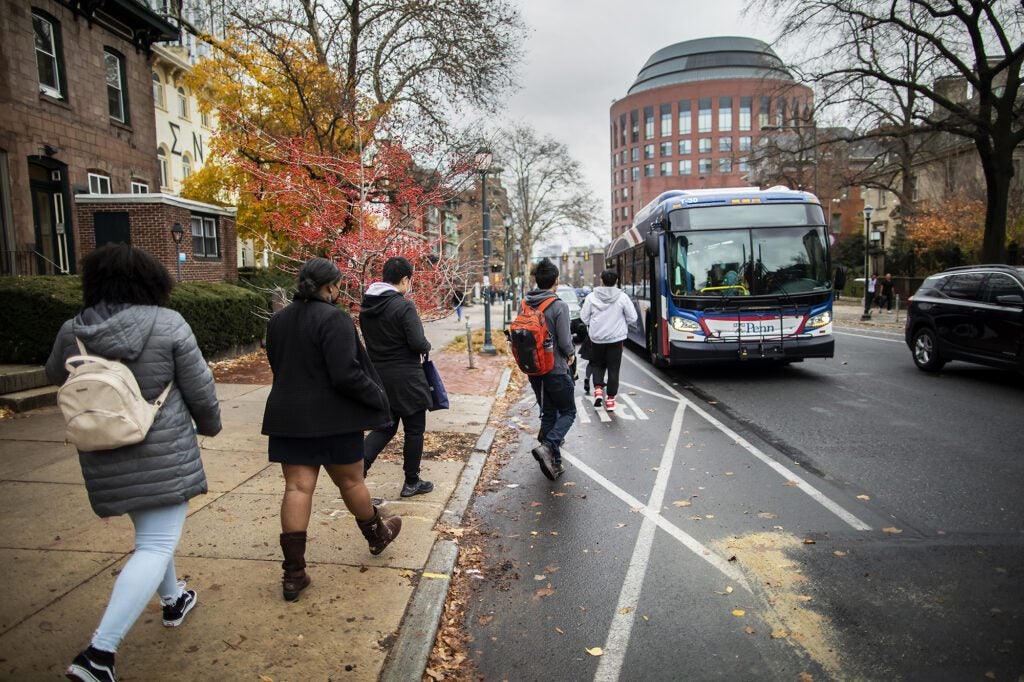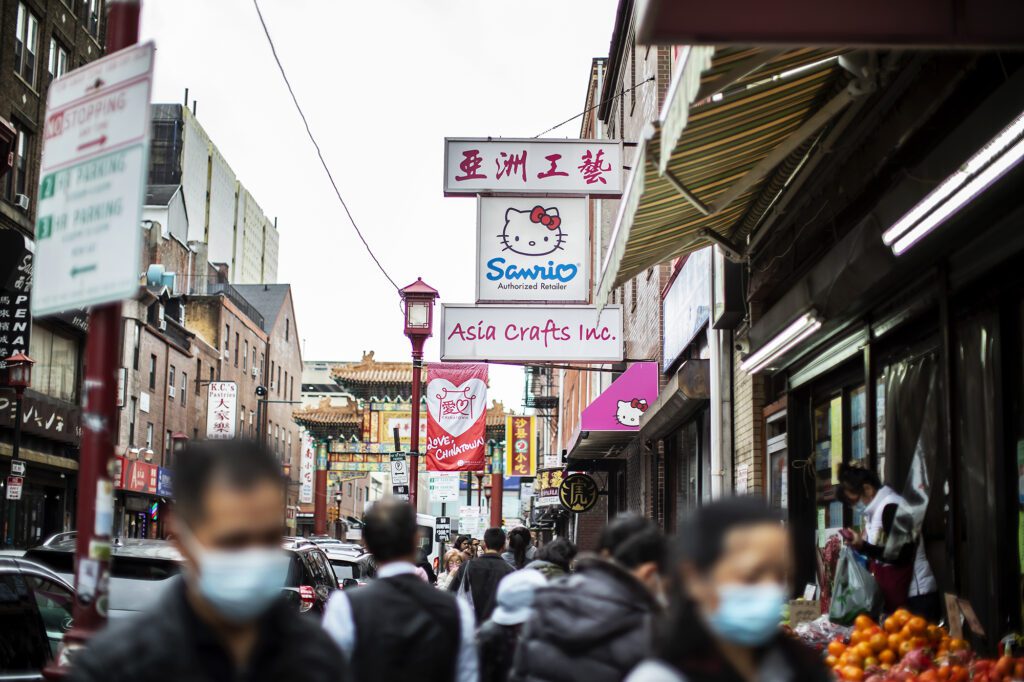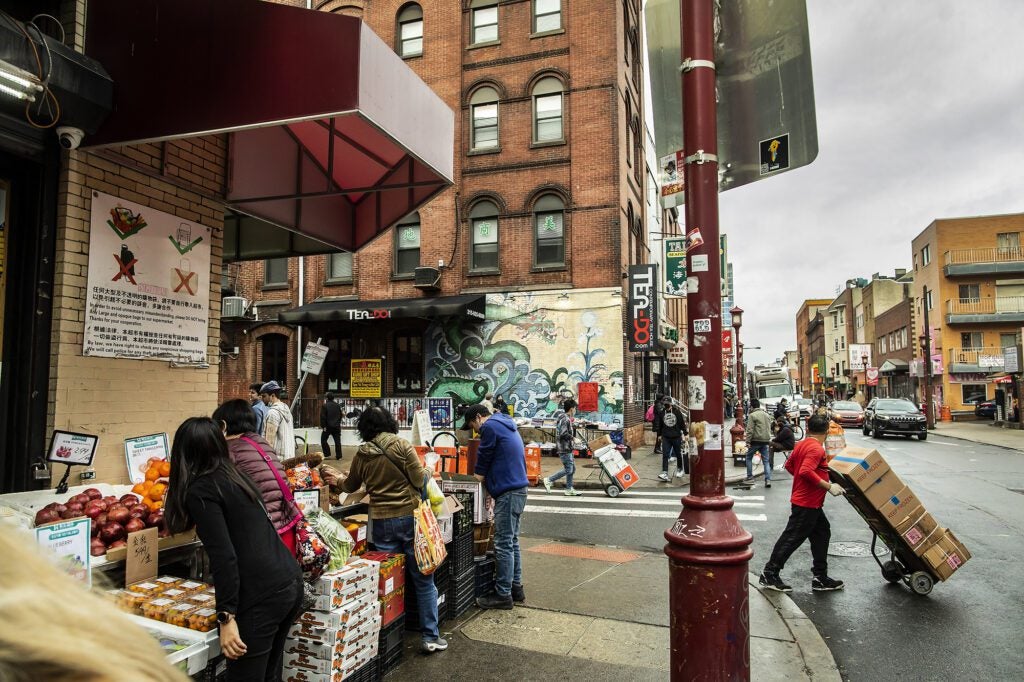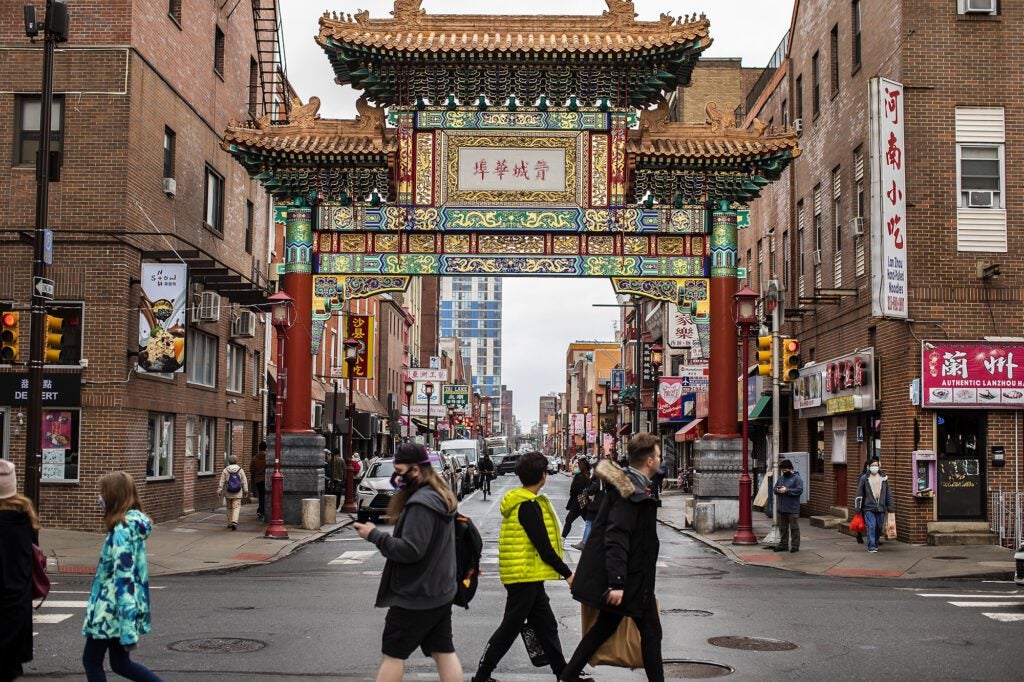Penn’s Approach to a “Career Everywhere” Model
Filmed at the annual National Association of Colleges & Employers (National Association of Colleges & Employers) conference, Michael DeAngelis, Senior Digital Resources Manager & Co-Host of CS Radio, shares Career Services’ philosophy of Career Everywhere.
University Life Represented at ’22 AFA Conference
Jessica Ryan, Director for Leadership Community in the Office of Fraternity & Sorority Life at the University of Pennsylvania was awarded the Shelley Sutherland Outstanding Volunteer Award at the ’22 Association of Fraternity / Sorority Advisors Annual Conference.
The Shelley Sutherland Outstanding Volunteer Award was established in 2003 and re-named for Shelley Sutherland upon her retirement in 2011. The purpose is to annually recognize outstanding volunteer service by an association member in an official AFA volunteer role. The individual has devoted significant time and energy supporting association initiatives or efforts through their volunteer role. They are consistent and reliable, communicative, and committed to the values and mission of the association as demonstrated through their service.
Ryan shared her excitement about attending the conference and receiving the award; “What an amazing experience! Thank you to the Association of Fraternity & Sorority Advisors for letting me chair the Educational Programs for the Annual Meeting Planning Team these last two years, and serve in volunteer roles with the association for the last decade. Truly a goal accomplished and amazing experience. Thankful to be recognized for volunteering with the association.”
The Penn Community Celebrates Campus Pride
The University of Pennsylvania Recognized as one of Campus Pride’s 2022 “Best Of The Best” Colleges & Universities for LGBTQ+ Students
Campus Pride, the preeminent resource for LGBTQ+ leadership development, diversity inclusion and advocacy within higher education, announced the annual Best of the Best Colleges and Universities for LGBTQ+ students in the United States, naming the University of Pennsylvania to this year’s list of campuses creating a safe, welcoming environment for students, faculty, and staff alike.
The announcement from Campus Pride features 40 four-year campuses from across the country. These campuses have achieved 5 out of 5 stars on the Campus Pride Index (CPI), the definitive national benchmarking tool measuring LGBTQ-friendly policies, programs, and practices. To earn a ranking of 5 out of 5 stars, campuses receive a percentage score from 90 to 100 based on their LGBTQ-inclusive policies, programs, and practices. The methodology to determine this year’s Best of the Best List was based on an overall score of 93 percent or higher.
Reopening the ARCH building
by Kristina Garcia-Wade
More than 100 students, faculty, and staff gathered in the ARCH building lobby amid the dulcet tones of the Penn Glee Club to celebrate the reimagining of the Arts Research and Cultural House (ARCH). The initiative will expand the scope of the cultural resource centers and affiliated groups, many of which were formerly housed at the garden level of the ARCH building. The centers will now have full use of the building, and Natives at Penn, formerly located at the Greenfield Intercultural Center, will join them.
Penn President Liz Magill spoke at the reopening ceremony. “For us to be a great university, we must be a welcoming, inclusive, and equitable community,” she said. “The reimagining of the ARCH building, so fully in step with this idea and so strongly guided by student input and student leadership, is a critical milestone on an ongoing journey we’re all working on. It embodies our efforts to make Penn a supportive place for our entire diverse community.”
The Sept. 7 event celebrated the culmination of a long-term project. In response to student advocacy for additional space for the cultural resource centers, University leaders affirmed expanded use of the ARCH building in the fall of 2021, and student advocates and University Life worked with Provost Administrative Affairs on a multiphase project. Planning will continue through the current academic year to assess longer-term opportunities.
“The additional student space in the ARCH signifies a continued commitment by the University to strengthen their support and resources for the expanding diverse student populations,” said Tamara Greenfield King, interim vice provost for university life, who oversaw the project. “This is just the beginning of many more enhancements to come.”
Mercedes Owens, former president of the Undergraduate Assembly, worked with University Life on this change, attending weekly meetings with a student steering committee with the goal of creating tangible change. “I knew this would require purposeful collaboration, intense conversations around activism and allyship, powerful relationship development, and, most importantly, the establishment of trust,” Owens, who graduated in 2021, said in an email. “Each generation of student leaders knows that making progress on this issue is one of the ultimate goals, especially the leaders belonging to marginalized communities.”
Many of these students see the need for social equity in the form of centrally located safe spaces, Owens said. “The ARCH expansion is an incredible first step to address this issue.”
The entire building now houses La Casa Latina, Makuu: The Black Cultural Center, Natives at Penn, and the Pan-Asian American Community House (PAACH) and includes common spaces and reservable rooms for community gathering, group study, and meetings.
The latter is essential, said Ashley Uppani, a third-year biochemistry major from Collegeville, Pennsylvania. Uppani is involved in the Asian Pacific Student Coalition and Spice Collective, which hosts “food-fueled discussions” for women and nonbinary people at PAACH. “With how involved all the cultural organizations are in planning events, ensuring the ARCH maintains space for use is essential, as otherwise we are left scrambling to find rooms,” she said.
The process to get this space has been a two-decade-long student advocacy process, said Jeffrey Yu, a fourth-year philosophy, politics, and economics major from Roslyn, New York, representing the Asian Pacific Student Coalition. “It went on before us and will go on after us. We’ll continue fighting for space.”
Yu participated in the ribbon cutting at the ARCH reopening, along with Magill, Taussia Boadi, a third-year sociology major from Westchester, New York, representing UMOJA, and Elizabeth Ramos, a second-year biochemistry major from Eastvale, California, representing the Latinx Coalition.
“Our goal, for a long time, was having our own individual houses,” said Ramos. “Seeing that we don’t just have a floor now and we have a whole building is a great first step.” Other positives for student representatives in the process included working directly with the administration and talking to with their constituencies and communities about what they wanted to see going forward, Ramos said. Building trust and transparency, she said, was paramount.
Ramos invited students to give feedback on the ARCH building. University Life created a survey where users can comment on building aesthetics, usage, and operations.
“The ARCH is now rebranded as a space for the cultural houses and their constituent members or affiliates,” said Boadi. “We should be prioritized in space as well as every other aspect of this building.”
“We’re going to fill it; we’re going to show we need more,” Ramos said. “We’re already doing that.”
Penn dedicates ARCH building to cultural centers after decades of student advocacy
After years of campaigning and student advocacy, Penn has begun renovations on the Arts, Research, and Culture House, designating it as the home to the University’s main minority coalition groups and cultural resource centers.
The grand reopening of the redesigned ARCH building, which will include remarks from Penn President Liz Magill, is set for Sept. 7 from 11 a.m. to 6 p.m. but renovations will continue through the spring 2023 semester.
The main minority coalition at Penn, known as the 7B, came to an agreement with the University in May to expand the cultural resource centers located in the ARCH’s basement — which include Makuu: The Black Cultural Center, La Casa Latina, and the Pan-Asian American Community House — into the rest of the ARCH building, incorporating study rooms, social spaces, and re-designated offices.
Natives at Penn, which joined the 7B in December of last year, will move from the Greenfield Intercultural Center to new space in the renovated ARCH building. Staff from Penn’s three cultural resource centers also moved upstairs from the basement as of Aug. 5. Second and third floor office spaces are being repurposed as group study and meeting rooms.
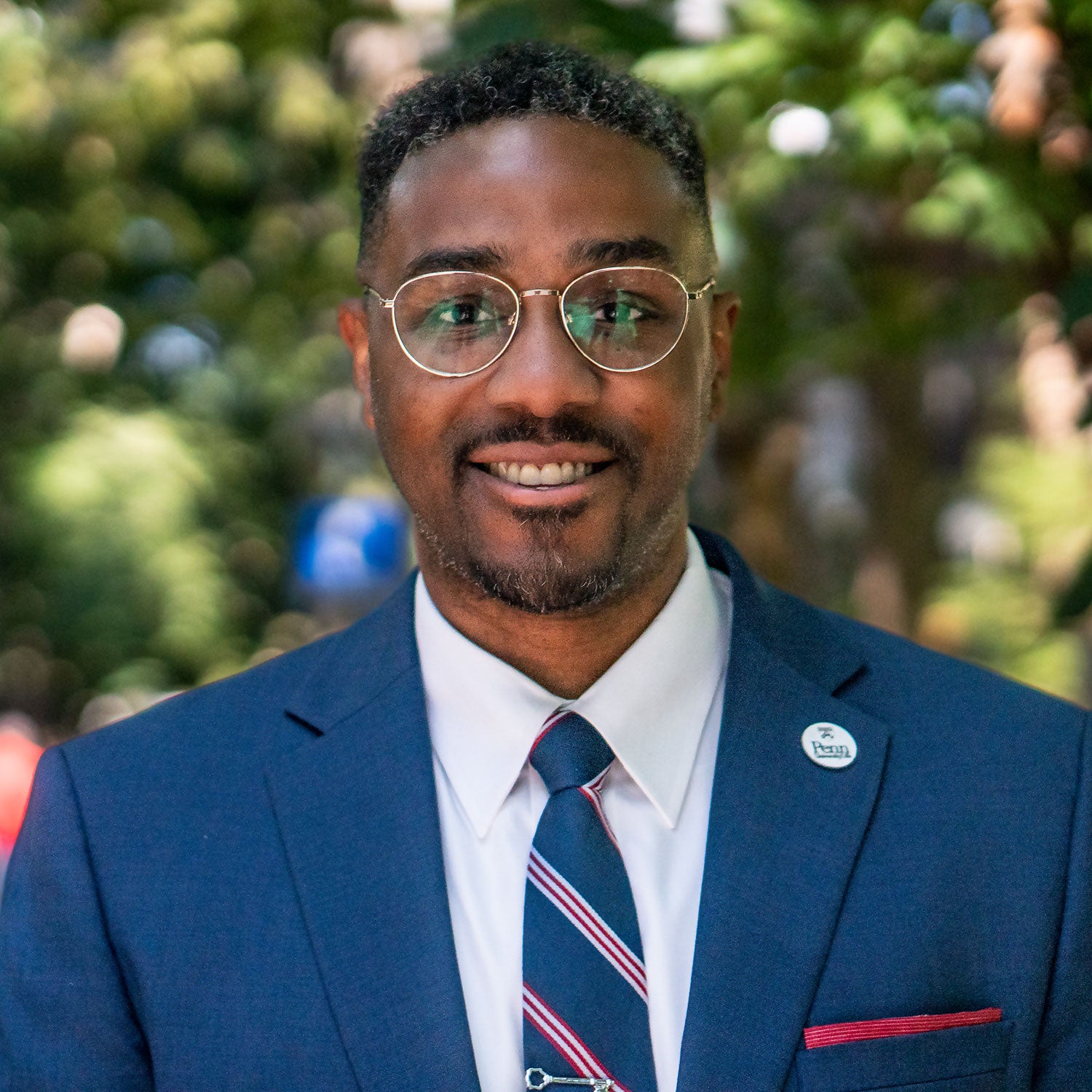
The renovations are being branded under the “Reimagining the ARCH” campaign. University Life, currently led by Interim Vice Provost Tamara Greenfield King, is overseeing the renovations in collaboration with students, cultural resource center staff, faculty, and administration.
King told The Daily Pennsylvanian that the University views the remodeling as a “welcomed, positive, historical moment” and a representation of the University “making good” on its commitment to its diverse student body after their years of advocacy.
“[Students] have advocated, on their behalf, for the opportunity to actually have more space on campus — have more social space — and been sometimes critical of the University,” King said. “But at this moment, we are proud to say they will have the ability and are being gifted the entire [ARCH] building for their access and use for educational programs, social programs, public events, by way of speakers, lecture series, and all sorts of cultural celebrations.”
ARCH is in the initial stages of remodeling and designating space for the respective cultural centers for groups in the 4B: UMOJA, the Latinx Coalition, the Asian Pacific Student Coalition, and Natives at Penn. The building will undergo aesthetic and physical changes this fall, primarily to the first floor.
“Inclusion and belonging are essential to the mission of the University, and we are proud to work with our students and the Cultural Resource Centers to create a vibrant and supportive home at the heart of campus in the ARCH,” Interim Provost Beth Winkelstein wrote to the DP.
The ARCH building, built in 1927, first housed Penn’s Christian Association. Prior to the renovations, the building was home to the Center for Undergraduate Research and Fellowships, scholar programs, meeting space, and administrative offices. The University relocated CURF to a “temporary home,” freeing up space for the CRCs.
Students — including leaders in the 7B and staff at the CRCs — were included in the conversation to remodel the ARCH building and decide how to equitably distribute the space. Some students, including Nursing sophomore Salvador Galvez Jr., who joined La Casa Latina as a programs assistant last year, expressed excitement to use the new space from the fireside lounge on the second floor to new opportunities for cross-center programming.
“La Casa became a second home, and I was there almost every day,” Galvez said. “I was advocating for the students and their space at La Casa and expanding that.”
“One of my biggest roles was advocating for our constituency, which is all Latinx identifying groups, what they wanted out of ARCH, and what they saw ARCH being,” College sophomore and Internal Chair of the Latinx Coalition Elizabeth Ramos said.
Ramos and Galvez were a part of one of three sub-groups in a student steering committee for the ARCH renovations. Students in the sub-groups were tasked with the space allocation, aesthetics, and building operations.
“We were given the floor plans of ARCH from the basement to the third floor,” Galvez said. “We were told what rooms were available, we were given the square footage of every room and how many, how many people they fit based on its capacity.”
The students on the steering committee ensured that a prayer room, group study rooms, and more spaces were present in the redesign proposal.
The Latinx Coalition and other groups have lobbied administrators to include a community kitchen, an addition that King said will be evaluated after administrators view how students utilize the ARCH space over the next six months. The grab-and-go food area near the entrance has been removed, she said.
“It’s just been incredible to feel really valued and listened to when our work went to administration,” Ramos said.
For years, students have advocated for more space for the cultural centers on campus. With the expansion of cultural space in ARCH, Ramos is hopeful that first-year students can feel more represented and included on campus.
“Generations of our community have fought for this for them,” Ramos said. “I’m excited to have [first-year students] see us in these spaces and get to know them.”
Students representing the main minority coalition groups are still determined to advocate for more cultural space on campus, including but not limited to, an individual house for each member of the 7B — a guarantee that helped earn the coalition’s support for the University’s proposal to remodel ARCH building after rejecting a previous offer to do so in January 2020.
“The administration promises that this was temporary, and that the long-term goal was to eventually have a Black cultural house,” College sophomore, UMOJA internal chair, and ARCH steering committee member Jessica Thomas said.
Philadelphia Gayborhood with Malik Muhammad
In celebration of Pride Month, University Life took a trip to the Philadelphia Gayborhood with Malik Muhammad, Associate Director of the LGBT Center, to learn about the history of the neighborhood, explore Malik’s favorite spots, and visit a few LGBTQ+ owned small businesses.
Embracing Pride Month is all about that sense of empowerment and giving power back to our communities to know we belong here - in this city and in this space.
Malik Muhammad
Special Thanks to
Jay Monahan | Interviewer & Editor
Steve McCann | Videographer
345 S 12th St, Philadelphia, PA 19107
Giovanni’s Room is the oldest, very best LGBTQ & Feminist bookstore in the Country and Philadelphia’s number 1 source for LGBTQ fiction & non-fiction books.
1315 Spruce St, Philadelphia, PA 19107
The William Way LGBT Community Center serves the LGBTQIA+ community of Philadelphia and its allies 365 days a year.
243 S Camac St, Philadelphia, PA 19107
Tavern on Camac is a gay-friendly tavern known for its piano singalongs & dance parties.

Throughout June, University Life will celebrate Pride Month with stories and interviews of influential figures in Penn’s LGBTQ community.
Sharon Smith, AVP for University Life Receives Penn Dental Honor
As part of Penn Dental Medicine’s commencement ceremony for the Class of 2022, the school recognized Sharon Smith, Associate Provost for University Life, with a special certificate of appreciation for her service to students. In her role at the University, Ms. Smith oversees a number of campus support programs and endeavors to holistically serve students navigating Penn.
Presently a member of Penn Dental Medicine’s Committee for Cultural Growth, Ms. Smith supports Penn Dental Medicine students and the administration in wide-ranging areas, including assisting with issues such as personal and academic emergencies, food insecurity, provision of urgent medical care, and providing assistance to the school’s international students.
Ms. Smith came to Penn in 1987, serving in various leadership positions throughout campus, including the Penn College Achievement Program, New Student Orientation, and Open Expression. She was instrumental in helping to create the mission and framework of the Student Intervention Services Office (SIS), which leads Penn’s response to emergencies and critical incidents involving students.
“For over 20 years, Sharon has been a dedicated and passionate supporter of Penn Dental Medicine students,” said Uri Hangorsky, Associate Dean for Student Affairs. “She has selflessly made herself available to work with us not only during regular working hours, but also during nights, weekends, and major holidays. She embodies the very best humanity has to offer—wisdom, compassion, integrity, and dedication.”
Projection and Pursuit: A Two-Fold Meaning of Longing
University Life shares the wisdom of Sam Strickberger, ’22 Class Board President and speaker at this year’s Commencement Baccalaureate Ceremony. Sam’s speech, Projection and Pursuit: A Two-Fold Meaning of Longing, is an inspiring reflection on pursuing your passion.
Thank you, Sam.
Penn is honored to have your energy and spirit. Congratulations!
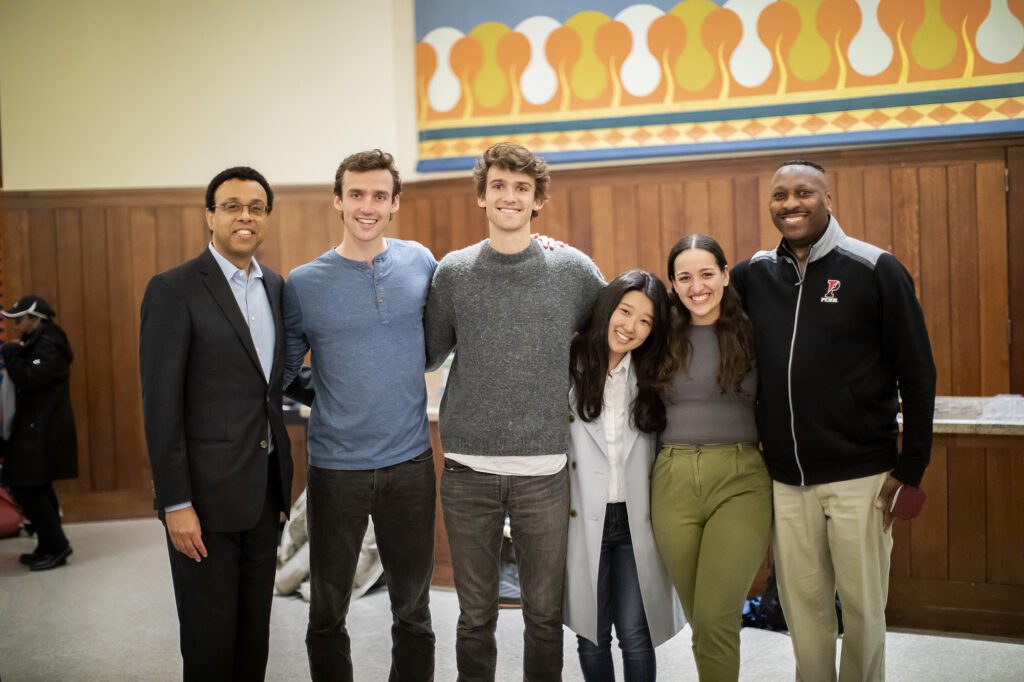
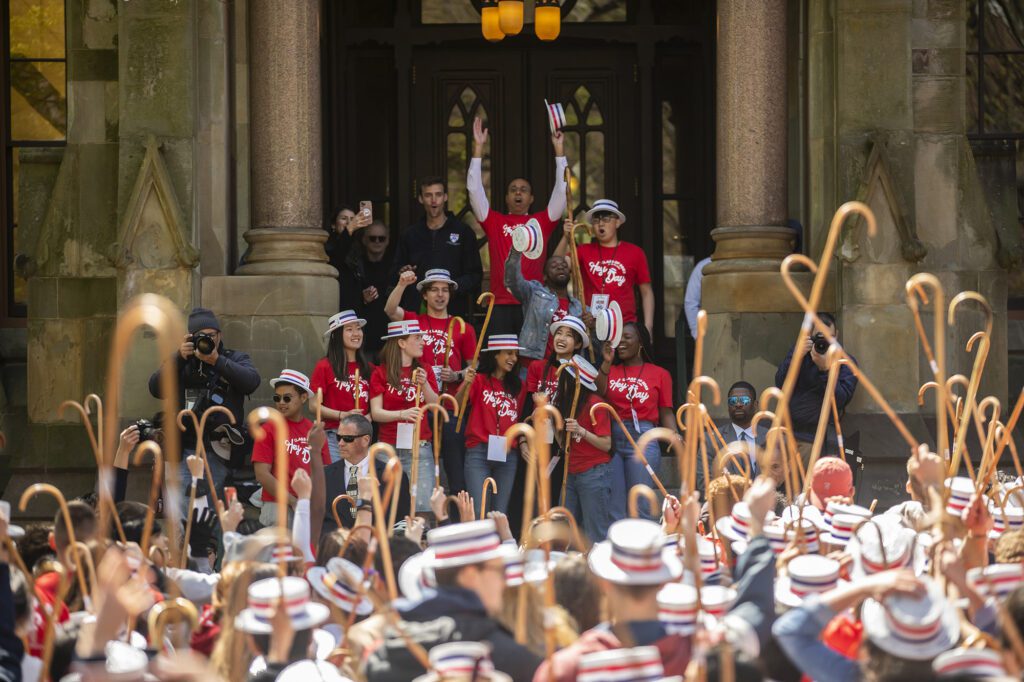
By: Sam Strickberger
Good afternoon, Class of 2022.
I can’t believe we are here. The last-minute assignments. The early morning practices. The late-night rehearsals. The rush of Locust. We’ve made it. In less than a week, we’ll walk out of Franklin Field as graduates of the University of Pennsylvania.
But, before thinking about the future, I want to rewind.
Do you remember during NSO when all the gap year kids were talking about how transformative their past year was. And you were like: nobody cares. Well, I was one of those gap year students. And, if you’ll indulge me, I’ll briefly talk about my gap year.
Prior to Penn, I spent a gap year in Jerusalem studying ancient Jewish texts – practical right – with a diverse group of Jewish Israelis and Americans. It was a pretty privileged time. I had limited responsibilities and was immersed in a place of inherent spiritual meaning. One concept from the year stood out: the idea of longing, seeking to find my home in the world, pursuing my “why.”
I started Penn with the nervous excitement that fills much of NSO. It was then that I first encountered the three classic, introductory questions: “What is your name?” “Where are you from?” And finally, the loaded one, “What do you want to do?” I had no idea what to say the first time I was asked it. I thought I had the next four years to figure it out…at the least.
We were a bunch of newly admitted students, who recently wrote in our college apps about being “intellectually curious” at Penn. I thought we came here to begin to figure out an answer to that question. And so, during NSO, when I did come up with my own answers to it, they seemed forced. The question incentivized a predetermined path, maybe even closed-minded projections for the future.
I learned from my experiences in Penn and Jerusalem that there are two conceptions of longing. There is Projection and Pursuit. To project is to think in the concrete, the linear, the practical, that what’s-been-proven. It’s the you-in-ten-years that you create today. It is a business plan. The business of living.
To pursue is to think in the abstract, the creative, the values-based, the finding-your-why. Hearing the whisper of your inner child. It is an artistic creation. The art of living.
Thinking of our NSO experiences. Projection is the question “what do you want to do?” Pursuit is the question “why do you want to do what you do?” Projection is the what. Pursuit is the why.
I want to give room for both. Not only because both are within me – and I imagine all of you. But because I deeply believe that both are crucial for success and flourishing. Projection without pursuit is an empty way to live; but pursuit without projection is unrealistic for achieving life’s goals, meaning, I imagine, we have to know how the world works, have the network, the skillset, the planning, to realize any big visions.
However, I think at places where we find ourselves surrounded by ambitious, brilliant people – places like Penn and likely where we are headed eventually – projection rules the day. So, today, I want to uplift pursuit.
In particular, pursuit is about the power and necessity of choice. “Man is condemned to be free,” writes Sartre, a twentieth-century existentialist. We are not free to choose, but we are free to choose, he argues. Did you get that? Neither did I. David Foster Wallace puts it more simply. “In the day-to-day trenches of adult life…There is no such thing as not worshipping. Everybody worships. The only choice we get is what to worship.”
And our apparent options aren’t all so great. Wallace continues, “if you worship money and things, then you will never have enough. Worship beauty, you will always feel ugly. Worship power, you will feel weak and afraid. Worship your intellect, you will end up feeling stupid.”
Worshiping something transcendent, on the other hand – things like justice, love, spirituality – helps guide us. Pursuit is discovering that deeper “why.” And projection has its place too: it helps us achieve our pursuits.
Here are a few examples.
As a first-year, Maeve Masterson told me that she wanted to pursue climate justice and while at Penn she wanted to find the skillsets that would enable her to do that best. Four years later, she is still pursuing climate justice and through her education she’s planned – or, to use our terminology, projected – how to get there: she gained experience as a leader of Fossil Free Penn and studied environmental science and decision sciences. And she’s walking away from Penn with a masters in social policy to continue her pursuit.
I think about other students who pursued justice while at Penn. I think about Mary Sadallah, a dear friend and first-generation college student, who – as Vice President of the UA – distributed nearly $1 million to largely benefit first-generation, low-income students and students of color. I think about Niko Simpkins, who leveraged his love of engineering to encourage, support, and create space for marginalized engineers by reinvigorating the Underrepresented Student Advisory Board in Engineering. The list goes on. So, I’ll give you one more example. I think of Sam Pancoe who created the PennGenEq preorientation program to foster an inclusive space for all gender identities on campus.
These successful endeavors of our classmates – and many like them – taught me important lesson. Prioritizing pursuit, and letting projection follow it, is powerful. It can help us to access meaning and even success, however we define it. On the other hand, when projection comes first, when we take the road most traveled without examining it for ourselves, we risk losing track of what we care about most.
Still, valuing our “why,” our “pursuit,” isn’t easy. It’s hard and not always possible. It was uncomfortable telling people you were “undecided” as an underclassman. It was anxiety-producing to still be figuring out where to apply for an internship when friends had already landed their “dream job.” There is discomfort and anxiety in pursuit.
What’s the antidote? I honestly don’t know. But, I’ve drawn some insights from the actions of my twin brother, Max, and my roommate, Alan Jinich, as they took off from school last spring – when I sat through my zoom classes – to crisscross the United States and create an oral history of our generation’s covid experiences. Their decision taught me what Penn positive psychologist Karen Reivich confirms through her research. That perhaps pursuit requires three things. It requires gratitude for what we have, curiosity for what can be, and, along the way, favorable judgment for others. Pursuit also requires patience. Patience to wait, to reflect, to do things differently.
So, with the power of our education – our acquired knowledge, skills, community, and yes, that expensive piece of paper called our diploma – we are uniquely positioned for pursuit.
So, I challenge our great class to not get stuck in projection, in worshipping the rat race, the highest paying job, the most prestigious next step. I encourage pursuing our “why” and hopefully connecting it to something bigger than ourselves, something holy, something like justice. As Benjamin Franklin writes at the bottom of every PennToday email: “The noblest question in the world is: what good may I do in it?”
Given the nature of the Baccalaureate ceremony, I want to close with a blessing of pursuit, a blessing which randomly hangs from a corkboard in my childhood home and fittingly was delivered at another college graduation ceremony but in 1985:
“May [we be blessed] with discontent with easy answers, half-truths, and superficial relationships, so that [we] will live from deep within [our] heart[s].
May [we be blessed] with anger at injustice, oppression, abuse, and exploitation of people, so that [we] will work for justice, equality, and peace.
May [we be blessed] with tears to shed for those who suffer from pain, rejection, starvation and war, so that [we] will reach out [our] hand[s] to comfort them and to change their pain to joy.
[And] may [we be blessed] with the foolishness to think [we] can make a difference in this world, so that [we] will do the things which others tell [us] cannot be done.”
Thank you so much for listening. A huge congratulations on graduation. We’ve finally made it.
Houston Hall to be revamped into ‘hub for students’ by Vice Provost for University Life
Houston Hall, the oldest student union in the nation, will undergo a renovations process to become a central hub of student life on campus, according to Penn’s Division of the Vice Provost for University Life.
Students have expressed for years that Houston Hall felt like “more of a dining area and study space than a hub of student activity.” This project, while still in early stages, hopes to address that sentiment, according to project leads Saleem Curry and Laurie Hall from University Life, who said they shared that the primary aim is to transform Houston Hall into a more inclusive, welcoming, and inviting space for students by restoring its status as a focal point of student life on Penn’s campus.
Before 2017, Houston Hall operated on a conference center model and was self-funded, according to Hall, the assistant vice provost for strategic planning and operations. She added that Interim President Wendell Pritchett has worked to dismantle that model to create a student hub during his tenure as provost.
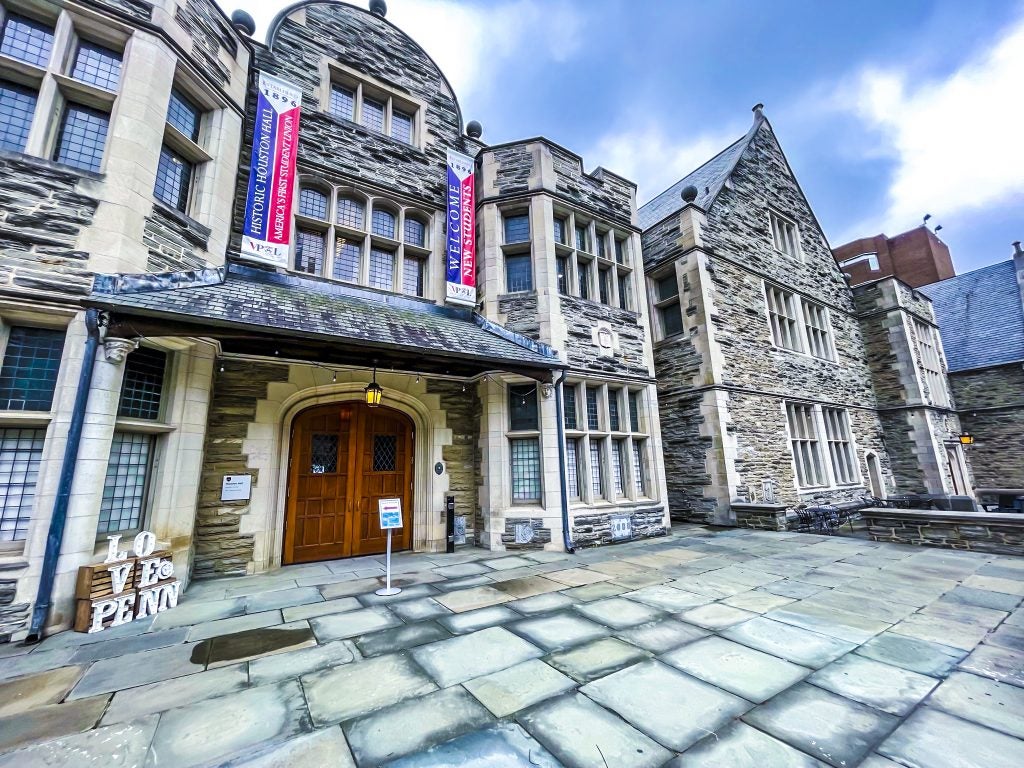
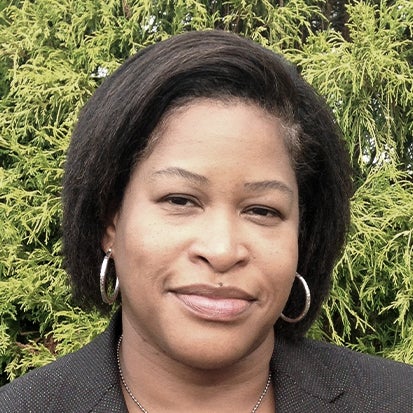
Curry, director of University Life Space and Events Management, said that although this project is rather abstract, he and Hall hope to involve students in the process as much as possible. He added that Pritchett’s idea to transform Houston Hall into a student-focused center came from students in the first place.
“What we [are] looking to do very shortly is to have a University Life space steering committee that is made up of students,” Hall said. She added that this committee would serve as a connection between all the different needs of the students.
Curry said that he hopes Houston Hall can “situate itself as a centralizing point” on campus and be a center for all types of campus involvement. In the future, Curry said he hopes that Houston Hall can host events on the weekends for students.
Students expressed that although there is nothing wrong with the current state of Houston Hall, there is a possibility for improvement into a more robust hub of student life.
College first year Sarah Garrison, who works as a Welcome Ambassador at Houston Hall, said she is excited about the potential of this project to welcome and bring together students on campus.
“In my personal experience, I have seen Houston Hall trying to implement some of these changes, and I think that it’s absolutely great. It would be nice to have [Houston Hall] to be a hub for students,” Garrison said.
Garrison noted that some students may feel cut off from Houston Hall when it is being used by specific clubs or for planned events.
College first year Julia Rotgin performed in the One Acts Festival hosted by the Theatre Arts Council in Houston Hall earlier this semester. Even so, she said that she does not have a reason to spend time in Houston Hall, and rarely frequents the space.

“Outside of that experience, I have not spent that much time in Houston Hall,” Rotgin said. “I haven’t been involved in anything else that used that space.”
While Rotgin frequents Houston Market, Penn’s food market located on the lower level, she said she does not frequent any other part of Houston Hall.
“We have the space. We should definitely take advantage of it,” Rotgin said.
A charter bus to Chinatown
hiladelphia was an adjustment for Jingzhi “Jacey” Chang, who arrived just before the pandemic. “You would feel homesick, definitely, and sometimes I think I would feel lonely,” says Chang who graduated from the Stewart Weitzman School of Design’s master of city and regional planning program last year.
During the early part of the pandemic, Chang, from Harbin, China, says she didn’t go outside for months. So when asked to think about transportation modeling in a course taught by Megan Ryerson, she thought about her own transit needs as an international student. Many of the sauces and vegetables she needed to cook for herself are not available locally in West Philadelphia. She says the first time she bought an American eggplant it was not what she expected. Yet she felt uncertain about taking public transit to Philadelphia’s Chinatown, feeling both fearful of anti-Asian racism and because not all transit riders were wearing masks. “So, I think I won’t be the only one,” she says. “I think some of the Chinese students are not familiar with asking for help. I think they are in need of help.” In three surveys with more than 300 responses, Chang saw there was a need for safe, reliable transportation to Chinatown.
The Chinatown charter bus service, launched as a pilot program in spring 2020, ferries anyone with a Penn card to and from Chinatown on alternate Saturdays, with buses running every 30 minutes between noon and 5 p.m.. On average, about 200 seats are reserved when the bus runs, says Peter Van Do, director of the Pan-Asian American Community House (PAACH), whom Chang consulted for help in her project. The service, co-sponsored by PAACH, the Undergraduate Assembly, the Graduate and Professional Student Assembly, and the Chinese Students & Scholars Association at Penn, in collaboration with Penn Transit, is staffed by volunteers. The service, which went on hiatus during the winter, is up and running again, with its next service on March 19.
When Chang graduated, she asked fellow design graduate student Jing Zhang of Beijing to take care of the project. Zhang coordinates the volunteers and volunteers herself. She says she’d like to see the program expand, with more stops to service the broader international community, but the project needs additional funding to survive past the pilot stage.
“I really like this service,” says Zhang. “I feel like it provides not only emotional support but also physical support to the Asian community.”
Wen Jiang, a second-year Ph.D. student in computer and information science in the School of Engineering and Applied Science from Shaanxi, China, takes the bus every two weeks to buy sauces and vegetables, he says. He learned how to cook from Chinese websites and YouTube and likes to make dapanji, “big plate chicken” with potatoes and peppers, and Laziji, a dish of spicy chicken from Sichuan cuisine.
Deborah Xie, a first-year graduate student from Nanyang, China, who is in the master of science in social policy program at the School of Social Policy & Practice, says she feels safer taking the charter bus. “It’s clean and on time,” she says, and builds a sense of community.

